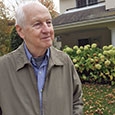Fenwick Smith, a distinguished, longtime member of the Boston Symphony and the New England Conservatory faculty, died on July 19, 2017 in Jamaica Plain, Massachusetts of complications from Alzheimer’s disease.
Smith grew up in Medford, Massachusetts and after finishing high school at the Cambridge School of Weston (MA), he began studies with Joseph Mariano at the Eastman School of Music in Rochester, New York. Convinced that he needed to take a year off to focus more intensely on flute fundamentals, Smith took a leave of absence from Eastman and returned home to the Boston area, where he studied with Doriot Anthony Dwyer, principal flutist of the Boston Symphony.
Following college graduation Smith moved to West Berlin to investigate employment opportunities and also to study with James Galway, the Berlin Philharmonic’s principal flutist at the time. Years later he described Galway as having been as much a great friend as an influential mentor. After several years in Germany he returned to Boston and began a free-lance career.
In 1978 he won the second flute position in the Boston Symphony and was a member of the orchestra until his retirement in 2006. During his tenure he also served for five years as acting assistant principal of the BSO and principal flute of the Boston Pops.
One of the finest flutists of his generation, Smith enjoyed a remarkably multi-faceted life as an orchestral musician, recitalist, concerto soloist, chamber music player, recording artist, teacher, and craftsman. Early in his Boston career he was a member of the New England Woodwind Quintet and performed for 13 years with Boston Music Viva, a contemporary music ensemble. He was a founding member of the Boston Chamber Society, with which he played from 1984 until 2011. He also played for 15 years in the Mélisande Trio with BSO principal violist Burton Fine and harpist Susan Miron. In addition, he performed on traverso with several early music ensembles around the Boston area.
Smith enjoyed a reputation as a highly effective teacher and chamber music coach. He joined the New England Conservatory faculty in 1982, teaching there until his retirement in 2012, and was also a greatly respected faculty member at the Tanglewood Music Center. Over the course of 35 years his annual recital on a Sunday afternoon in early September came to be the eagerly-awaited opening event of Boston’s new concert season. Year after year Smith’s superb musicianship and imaginative programming drew a large and devoted crowd of fans who knew they would always be treated to new repertoire. NEC’s Jordan Hall became Smith’s recital venue after he joined the conservatory’s faculty and since 2013 the school has hosted an annual Fenwick Smith Tribute concert in early September by the winner of the James Pappoutsakis Competition.
Smith recorded extensively and can be heard on the Nonesuch, Hyperion, Koch, and Naxos labels. His discography includes numerous premiere recordings of such composers as Cage, Copland, Dahl, Foote, Gaubert, Ginastera, Harbison, Heiss, Koechlin, Pinkham, Reinecke, Rorem, Schoenberg, and Schulhoff. An insightful and colorful writer, Smith contributed valuable liner notes to his varied recording projects. His concerto appearances introduced Boston audiences to works of Lukas Foss, John Harbison, and Christopher Rouse.
As a young boy Smith enjoyed making model trains and credited that hobby with having developed his eye and manual dexterity. At age 17 he was hired as a flute maker by Verne Q. Powell Flutes and continued to work for them for over a decade. At James Galway’s insistence he met in England with Albert Cooper and then convinced the Powell company to adopt the Cooper scale. His action ultimately revolutionized flute making in the U.S.
Smith made his own flute and further demonstrated superb gifts as a craftsman by singlehandedly building his solar, post and beam summer home in the Berkshires over a seven-year period in the 1980s. In 1995 he purchased and began renovating a large building in the Boston suburb of Roslindale that contained a Masonic Temple. His creative vision resulted in a state-of-the art recording studio in which many high-profile musicians continue to record their CDs.
Fenwick Smith received numerous honors over the course of his career, including NEC’s Laurence Lesser Award for Excellence in Teaching (2001), the Boston Musicians’ Association’s Musician of the Year Award (2008), and the National Flute Association’s Lifetime Achievement Award (2010). His former students hold positions in major orchestras across the United State and internationally, including in New Zealand, Australia, Taiwan, and Singapore. An interview with Fenwick Smith may be found in The Flutist Quarterly, Spring 2010 issue (nfaonline.org).





